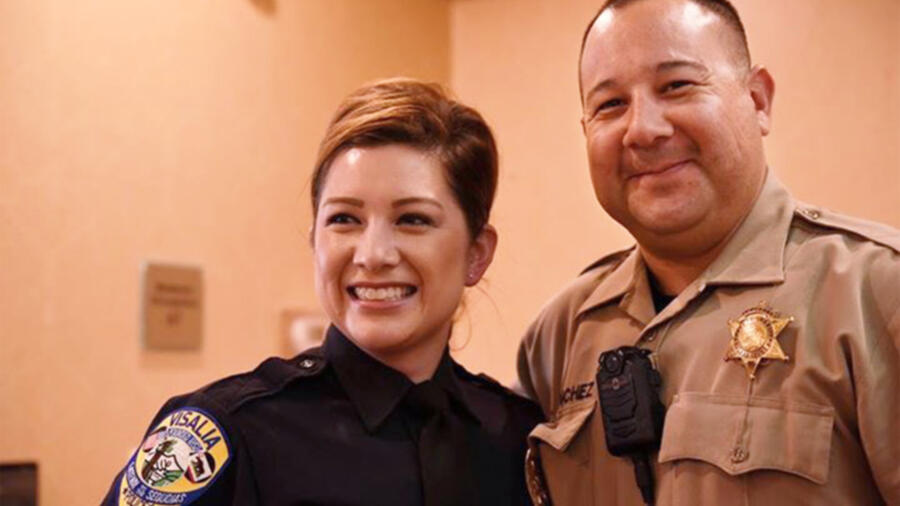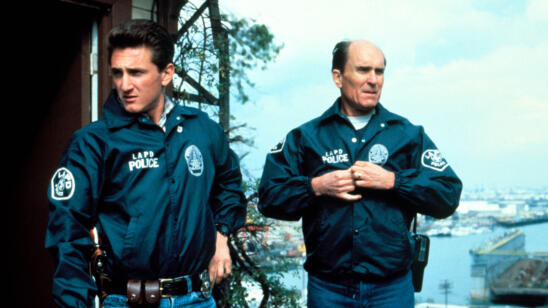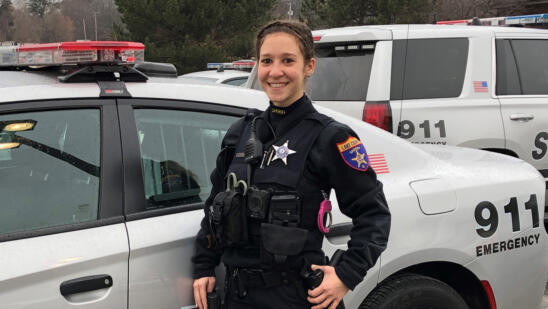This article was originally published on October 13, 2017, shortly after the Las Vegas Shooting.
Avid country music fans Steven and Celeste Sanchez, like so many others at the Route 91 Harvest Festival in Las Vegas, were prepared for a fun night out on October 1, 2017. They were excited to have snagged prime positions by the stage to watch headliner Jason Aldean perform.
Then came the gunshots.
The married couple both work in law enforcement back home in California: Celeste, 36, is a violent-crimes detective for the Visalia Police Department. Steven, 35, is a sergeant with the Tulare County Sheriff’s Department SWAT and Gang Unit.
Though not speaking in any official capacity of their respective police departments, they told the story of that tragic night to A&E True Crime.
Celeste: When we started hearing the popping noise, I didn’t even register them as gunshots. We were at a country music concert. Why would there be gunshots here? I actually thought they were fireworks.
Steve: At first the gunfire sounded like a speaker malfunction. But then I asked Celeste if she thought they were gunshots. She didn’t think so. But then the second round of bullets came and everyone got down.
Celeste: When I heard the shots again, Steven told me to lay down on the ground. It was cold and wet with beer, and my cheek was pressed into the concrete.
I remember seeing my sons’ faces. I knew we couldn’t die out there. We needed to get back to them.
Steven: We heard a lady screaming about five feet behind us: ‘Please help my mom! Please get her out!’ We crawled over to the injured woman. She had been shot through her right arm and into her right torso.
We needed a tourniquet. Someone gave me a piece of clothing to tie her arm off. We knew we needed to get the woman help right away, but the bullets started flying again. Everyone was screaming. But Celeste and I knew we needed to remain calm. I told Celeste that she needed to get out of there so she could get back to the kids. I couldn’t imagine leaving our boys alone in the world.
Celeste: When Steven told me to leave I told him ‘No.’ We went into law enforcement together. We were going to do this job together. I told him I was staying.
We waited for the gunfire to stop and with the help of an off-duty Orange County sheriff’s deputy, we made a plan to get the injured woman out of the area. I got her legs and Steven took her arms. We quickly made our move toward the exit under what seemed like endless gunfire.
Steven: Once we got to the gate we realized there was no triage set up. There were bodies on the floor and in the street. Police officers were telling people there that there were no ambulances around so to load the injured in other vehicles.
We took the woman to the parking lot and saw a truck. We asked the driver to please take her to the hospital.
Celeste and I made our way back out to the front gate.
Just outside the gate there was a team of eight police officers suited up and ready to go inside. They told us that we couldn’t go in. But I told them that I was an off-duty SWAT sergeant. An officer told me to ‘jump in line.’
I was unarmed and didn’t know where the shooter was, but I followed the police team inside the barricades. I left Celeste at the front gate.
Celeste: I couldn’t just wait at the gate, unarmed and alone, so I reentered the festival. There were people hiding under the stage, under tables, under the bar. There were bodies everywhere. I think our law-enforcement training had a lot to do with my ability to remain calm in that moment. I saw people frozen in fear. They had an opportunity to run and they wouldn’t run.
I ran over to a man who was holding his dead wife in his arms, cradling her. He begged me to ‘please take her out.’ I had to tell him we needed to leave his wife there. I knew the field was an active crime scene. There would be a homicide investigation. As a survivor he had to leave.
I’ve never seen anything like that before and I hope I never do again.
Steven: I worked my way south with the police, helping clear the area and direct survivors to safety. After the squad moved to a different position, I stayed behind and picked up a plastic wheelbarrow, which I remembered seeing earlier being used to transport ice.
I started finding people who had been shot, loading them up in the wheelbarrow and taking them out.
I met up again with the Orange County deputy, an off-duty L.A. county firefighter and a surgeon. We kept loading up injured bodies and taking them out to the gate, where civilian cars and trucks were transporting victims to the hospitals, until there were no more bodies left to carry out.
Celeste: I saw some guys taking apart a red three-foot barrier and laying pieces on the ground to act as a gurney. I grabbed a corner piece of the barrier and started helping them bring bodies to The House of Blues. Every time we loaded someone up and got them out I would turn around, and it would seemed like the number of people down on the ground doubled. It was never ending. Everything was covered in blood and slippery.
But I kept focus on getting anyone out who was still alive or had signs of life.
Steven: About an hour and a half after the shooting stopped, I met up at the front gate with Celeste. All I wanted to do was head back to my hotel and take a shower and go to sleep, but the hotel didn’t want to let us in. I identified myself as [law] enforcement and told them to take a look at the blood on my clothes.
A manager came over and let us in almost right after that. We showered and we tried to sleep, but—of course—we couldn’t.
Monday, we drove back home. It was the longest ride of our lives. The shooting was all over the news and we were replaying everything in our minds. We cried a lot.
When we got home, I searched online for the first victim we helped, the one whose daughter begged us to get her out of the area. We found out she had died.
I felt a lot of guilt. I wished there was something we could have done. I wished we could have gotten her out earlier.
Celeste: When we got home our older son, who is 15, was already home from school. We then went and picked up our youngest son, who is 5, at school. Just seeing them was overwhelming because we came so close to never seeing them again.
Our perspective on life is totally different now. In the past it would bother me if my son didn’t take out the trash or Steven didn’t do the laundry. Now I find myself wondering why I’d get upset at something so petty. After going through something like this, you realize how quickly your life can be gone, how quickly your life can change.
We went back to work that Wednesday. Both of our departments have been so supportive.
We’ll never be the same, but we are not going to let this change who we are inside.
My mom says she doesn’t want me going to country concerts anymore. I told her Steven and I will continue doing what we love. We can’t stop living our lives. We aren’t going to give any satisfaction to anyone who tries to take that from us.
Steven: We are not looking for recognition. A majority of first responders acted the same way, even the ones off-duty. I just want people to know that the media, I think, sometimes paints a bad picture of cops. When the shooting happened, we didn’t think about race, we didn’t think about gender, we didn’t think about religion. Helping out was just the American thing to do.
Related Features:
How Do Coroners Handle a Mass Tragedy Like the Las Vegas Shooting?
Mass Shooting Survivor: Here’s What to Do If a Gunman Is Headed Your Way


